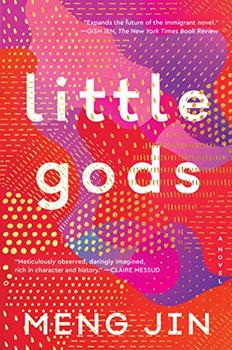Summary | Excerpt | Reading Guide | Reviews | Beyond the Book | Readalikes | Genres & Themes | Author Bio

The hall stinks. Bodies lie perpendicular to the wall, bleeding and burned black. The nurse has seen plenty of blood and should not be surprised by it. In the operating room she has learned to dissociate blood from the human. But these people are not inside an operating room, and their blood does not seem material, like flesh or bone, but rather like a too-human thing. It is almost pretty. The nurse looks at the people along the wall and sees their blood as a painter sees paint, coloring in who they are. She pushes the cart through the hall. The living look up, blinking, at what she brings.
The makeshift maternity ward is a mess of beds and chairs. Cots crammed in every space, families squatting on the floor. The nurse enters the first room with her cart. New parents and grandparents sit up and crane their necks. They catch their joy and hold it close, afraid or ashamed to hope. Outside, it is finally quiet. For the first time in months, the adjacent street is deserted.
The nurse picks up the newborns and reads off the mothers' names. Families come forward and collect their babies one by one.
When her cart is empty she calls out the name Su Lan. There is no response. She sees a woman alone in the corner cot, a body turned to the wall. She unwraps the girl from her chest and walks over. She sits at the edge of the bed and waits.
Finally the woman turns. Again the nurse is fascinated by her face, how each feature taken alone is plain and unmemorable: the small and single-lidded eyes, the straight nose, the pale lips. It is attractive but not pretty, not quite, and it strikes the nurse that it would be a good face for an actress—the kind of face that could become anything with just a few lines of makeup, that, like a mirror, reflects the viewer back upon herself.
Su Lan's eyelids are swollen, her eyes glassy. She looks at the nurse and says: Do you believe in time?
Time?
Do you believe, Su Lan continues, that the past is gone and the future does not yet exist?
For a moment the nurse is quiet. Then she says, Yes.
Su Lan stares. She begins to scream. The screams are short and breathy and sound like a repeating mechanical alarm. The nurse covers the daughter's ears. Someone else's mother-in-law leans over: Su Lan has been hysterical all night, calling for her husband. Apparently she begged the doctors to let him inside the delivery unit, but of course this was impossible. Afterward the man could not be found. The mother-in-law lowers her voice and looks meaningfully at the nurse. She says, When was the last time you saw a yunfu at the hospital all alone?
A woman, all alone. The nurse wants to touch her. She wants to cover the screaming mouth and smooth the damp hair from the face.
She wraps the daughter to her chest and stands to leave. Her legs buckle. She sits back down. For a moment she feels her exhaustion. She has not slept in over twenty hours. She has not eaten in ten. She shakes her shoulders and stands again, breathing slowly, and heads for the second maternity room.
In the second room are women in labor, and one who just arrived, heaven knows how.
Near dawn, Su Lan takes her child. She holds her daughter's neck in her palm and does not smile. The nurse wants to say something to Su Lan, something final and wise, as if she is at this woman's deathbed. She opens her mouth, closes it, stands up, leaves. She goes to a washroom, splashes water on her face, and steps outside. It is raining. She does not look at the stained ground or the smoldering carcasses of tanks and cars. She does not look at the elderly couple burning mourning money at the steps. She lights a cigarette and listens to the hiss. The front of her frock, where Su Lan's daughter was strapped all night, is damp and suddenly cold.
Su Lan will live for another seventeen and a half years—not an insignificant amount of time. Enough to turn an infant into a woman, a Chinese into an American. But the nurse's feeling is correct. Today, Su Lan begins to die.
Excerpted from Little Gods by Meng Jin. Copyright © 2020 by Meng Jin. Excerpted by permission of Custom House. All rights reserved. No part of this excerpt may be reproduced or reprinted without permission in writing from the publisher.
At times, our own light goes out, and is rekindled by a spark from another person.
Click Here to find out who said this, as well as discovering other famous literary quotes!
Your guide toexceptional books
BookBrowse seeks out and recommends the best in contemporary fiction and nonfiction—books that not only engage and entertain but also deepen our understanding of ourselves and the world around us.